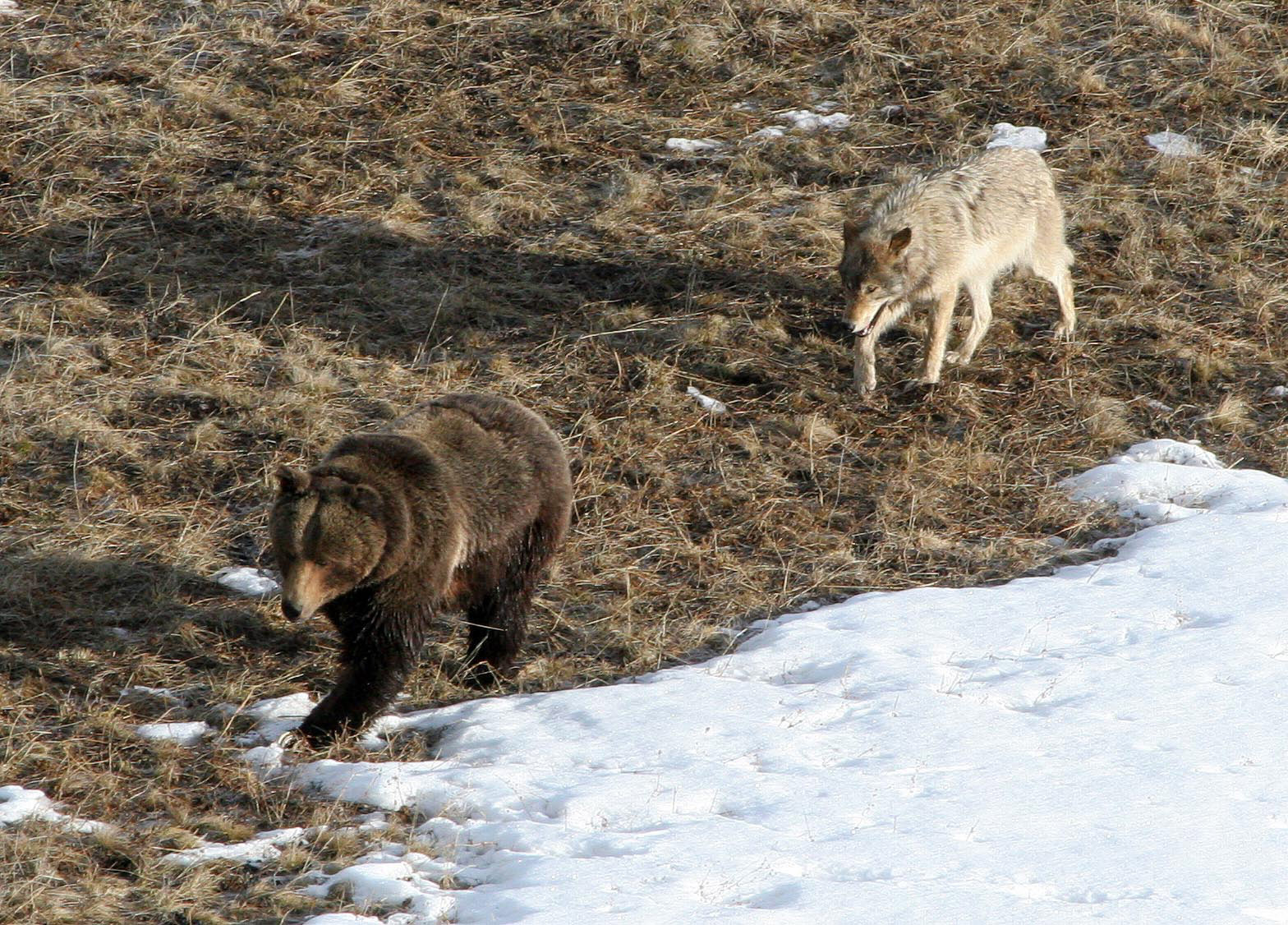The judge ruled that wolf trapping and snaring in grizzly habitat outside of denning season could have “profound effects” on Idaho’s grizzlies

The ranges of gray wolves and grizzly bears overlap in parts of Idaho. Photograph by Doug Smith / NPS
Idaho trappers will have fewer opportunities to trap and snare wolves in grizzly country due to a federal judge’s ruling that eliminates year-round trapping on private land in grizzly bear recovery zones and shortens the public-land season there by six weeks. In her summary ruling issued Tuesday, U.S. Magistrate Judge Candy Dale said these cuts were necessary to protect the state’s grizzly bears, which are still federally protected under the Endangered Species Act.
Effective for the 2024-25 trapping season, the Court’s decision halts the trapping and snaring of wolves in the Panhandle, Clearwater, Salmon, and Upper Snake Regions on both public and private land between March 1 and Nov. 30. These activities will still be allowed during the remaining three months of the year when grizzly bears are in their dens.
“There is ample evidence in the record, including from Idaho’s own witnesses, that lawfully set wolf traps and snares are reasonably likely to take grizzly bears in Idaho,” Dale wrote. “It is undisputed that trapping and snaring seasons in Idaho overlap periods where grizzly bears are known to be out of their dens, thereby increasing the risk that a grizzly bear will be taken.”
Read Next: Bounties, Petitions, and Politics: Why the Wolf War Is Only Getting More Extreme
Dale’s ruling comes in response to a 2021 lawsuit that was filed by environmental and anti-hunting groups like the Center for Biological Diversity and the Humane Society of the U.S. against Idaho Gov. Brad Little, the Idaho Department of Fish and Game, and members of the Idaho Fish and Wildlife Commission. These groups argued that new legislation establishing a year-round wolf trapping season on private land and allowing for the unlimited purchase of wolf tags statewide violated the ESA by jeopardizing Idaho’s grizzly populations.
Although she sided with the plaintiffs, Dale rejected their motion to ban all wolf trapping and snaring in grizzly bear habitat until Idaho could obtain an Incidental Take Permit from the U.S. Fish and Wildlife Service.
“Instead, the Court’s injunction will be limited to the period when grizzly bears are reasonably certain to be out of their dens.”
Dale’s ruling cited past examples of grizzlies that were accidentally caught in by wolf trappers in Montana, Wyoming, Idaho, and Canada. It hinged on a pair of incidents from 2020, when two grizzlies died in Idaho’s Boundary County after getting caught in wolf snares.
The state was quick to point out that both these sets were illegal, as they lacked the breakaway devices or cable stops required by IDFG regulations. However, Dale said these incidents still served as proof that wolf trappers “are reasonably likely to take grizzly bears even when traps and snares are lawfully set.” She explained that under the current definitions of the ESA, even a grizzly bear that’s released alive and well from a wolf trap or snare would be considered “taken” by the USFWS.
There are currently an estimated 200 grizzly bears in Idaho, with roughly half of these inhabiting the Cabinet-Yaak and Selkirk recovery zones in the Idaho Panhandle, where Boundary County is located. Idaho politicians say these numbers serve as abundant proof that the state’s grizzly bear population has adequately recovered, and they’ve continued to condemn the fed’s decision to keep grizzlies on the Endangered Species List. In February, three of these legislators sent a letter to USFWS Director Martha Williams demanding that the management of the species be returned to the state.
Read Next: Two Hunters in North Idaho Shoot and Kill a Grizzly Bear in Self-Defense
Until that day comes, however, Dale said the trapping and snaring of wolves in grizzly habitat outside denning season poses an unacceptable risk to the bears.
“In examining the appropriate relief, the Court is mindful that the balance of hardships always favors preservation of the species,” Dale wrote. “Thus, the reality of even one take could have profound effects upon Idaho’s grizzly bear population.”
